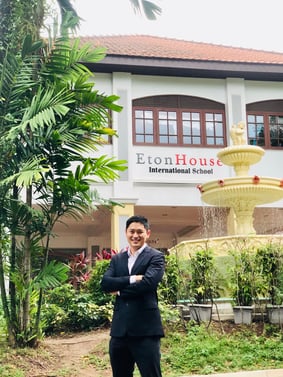-1.png)
EtonHouse Singapore
.png?width=238&name=MicrosoftTeams-image%20(37).png) Father's Day is celebrated worldwide to recognise the contribution fathers and father figures make to the lives of their children. As we honour this special day with quirky dad jokes and heartwarming quotes, we speak to Ng Yi-Xian, Group Chief Executive Officer, EtonHouse International Education Group on his parenting journey. Yi-Xian fathers twin boys, Kiran Ng 黄启光 and Keegan Ng 黄启亮 who are about 15 months old.
Father's Day is celebrated worldwide to recognise the contribution fathers and father figures make to the lives of their children. As we honour this special day with quirky dad jokes and heartwarming quotes, we speak to Ng Yi-Xian, Group Chief Executive Officer, EtonHouse International Education Group on his parenting journey. Yi-Xian fathers twin boys, Kiran Ng 黄启光 and Keegan Ng 黄启亮 who are about 15 months old.
1. What does it mean to be a father?
I vividly remember seeing my twin sons for the first time during an ultrasound scan at the gynaecologist. I was so awestruck that it took me several hours before I was able to speak. I spent the rest of the day in a daze, so overcome with joy that I was going to become a father to twins!
.png?width=251&name=MicrosoftTeams-image%20(39).png)
There are many ways to describe fatherhood. Love, joy, exhaustion, responsibility. It is all those things at once. Fatherhood is undeniably a new chapter in a man’s life. This new chapter is less obvious and less celebrated compared to motherhood, but it is nevertheless a transformation that every father undergoes. It is very different from motherhood in the sense that all mothers experience a huge biological shift which leads to psychological changes. Whereas for fathers, the transformation happens from within, we can choose what kind of father we want to be for our families. Therefore, each man gets to decide how he wishes to transform. Of course, all fathers are like mothers in wanting the very best for their children.
2. In families, mothers are often doing the bulk of parenting whereas fathers could sometimes be passive. Has this changed and what are your thoughts on this?

Fathers face a lot of pressure from society to provide for their families. This is the same in all cultures and it is a belief that has been ingrained into us from the time we were children. Furthermore, because fatherhood is a very personal transformation, it is easy to make providing for your family the most important expectation that a father has for himself. Despite women entering the workforce many years ago, these ideas and values take much longer to change.
Raising children is a team effort. My wife and I both share the responsibility of bringing up our children together. Like any team, goal setting is very important. It is best that both parents agree on what values they want their children to have. Otherwise, the child will grow up with three value systems, one to make mummy happy, another to make daddy happy, and yet another where they are utterly confused! In addition, I also believe both parents need to always collaborate and communicate with each other. When my wife is tired, I try my best to help her. When we are both tired, we try our best not to fight.
3. Parents are spending more money and energy on bringing up their children. With severe competition in schools and work places, this leads to anxious parents and children. In a sense, parents feel obliged to provide their children with the very best and help their children succeed in this race for perfection. What are your thoughts?
In the Reggio Emilia philosophy, they empathise that children need “tempo” (time), time to explore, be curious about the world around them, and learn at their own pace. I think of this concept very often whenever I encounter this question. If you have read the book ‘The Hurried Child’ by David Elkind, he alludes to this anxiety and stress that we experience as parents and pass on to our children. The constant overscheduling and race to provide what adults think is best for children leads to children feeling anxious, tired, and often burnt out and uninspired with learning. At the end of the day, we all want our children to be happy but we end us making them miserable with unnecessary anxiety and expectations.
Instead of succumbing to societal pressure and getting caught up in the rat race, it is important to remember what our long-term goal is. After all, you can say that parenting is love towards separation, as our children will one day become independent adults. We want to prepare our children for life, not just for the next exam paper or test. They need to be resilient problem-solvers who can adapt to whatever comes their way.
At EtonHouse, we always believe that it is crucial to inspire in children a genuine love for learning while being respectful towards their talents and abilities. When children are respected, and their uniqueness celebrated, they will grow and flourish in their own right. As a father, I am happy that my children will be in an EtonHouse school where their uniqueness will be nurtured.
With that in mind, we must ask ourselves if that extra tuition will help them or hurt them? I often feel that educational excellence does not always equate to a flourishing adult.
The reality is that life does not resemble exams. There are no multiple choices nor model answers to solving a problem. And what we learn today may one day become obsolete in our fast-changing world.
Instead, take the time to help your child find what they love to do, encourage them, give them the space to explore, think, and learn. This will help nurture highly engaged children who are motivated to push learning boundaries and achieve great success in whatever they put their hearts and minds to.
In conclusion, I believe it is important to be patient with our children. Remember how we want them to flourish long-term. And remember that educational success does not always equate to success as an adult.


